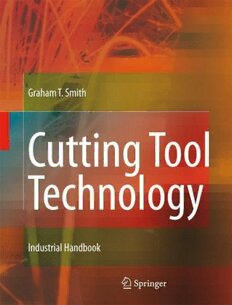
Cutting Tool Technology: Industrial Handbook PDF
605 Pages·2008·47.376 MB·English
Most books are stored in the elastic cloud where traffic is expensive. For this reason, we have a limit on daily download.
Preview Cutting Tool Technology: Industrial Handbook
Description:
It is a well acknowledged fact that virtually all of our modern-day components and assemblies – domestic, medical, industrial, automotive or aerospace, etc. – rely to some extent on machining operations in their manufacturing process. These wide-ranging manufactured components clearly show that there is a substantive machining requirement, which will continue to grow and thus be of prime importance for the foreseeable future.Cutting Tool Technology provides a comprehensive guide to the latest developments in the use of cutting tool technology. The book covers new machining and tooling topics such as high-speed and hard-part machining, near-dry and dry-machining strategies, multi-functional tooling, ‘diamond-like’ and ‘atomically-modified’ coatings, plus many others. Also covered are subjects important from a research perspective, such as micro-machining and artificial intelligence coupled to neural network tool condition monitoring.A practical handbook complete with troubleshooting tables for common problems, Cutting Tool Technology is an invaluable reference for researchers, manufacturers and users of cutting tools.Prof. Graham T. Smith is a Chartered Engineer and a Fellow of the Institutions of Mechanical and Electrical Engineers. A founding member of the International Conference on Laser Metrology and Machine Performance, he went on to become the founder and Chairman of the International Conference on Industrial Tooling. A fully skilled craftsman from a heavy toolmaking background, the author has also lectured widely across both Europe and North America, while he continues to undertake industrial consultancy and Expert Witness litigation activities.
See more
The list of books you might like
Most books are stored in the elastic cloud where traffic is expensive. For this reason, we have a limit on daily download.
